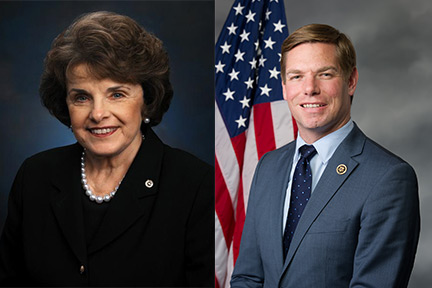WASHINGTON, D.C. – Today, Senators Orrin Hatch (R-UT) and Dianne Feinstein (D-CA) and Representatives Jim Sensenbrenner (R-WI) and Eric Swalwell (D-CA) introduced the bipartisan, bicameral Rapid DNA Act. This legislation would establish a system to enable law enforcement officials to use Rapid DNA instruments to help reduce DNA backlogs. Unlike traditional DNA analysis, which can take weeks, Rapid DNA analysis permits processing of DNA samples in approximately 90 minutes or less.
This technology has the potential to revolutionize the way in which individuals arrested for crimes are enrolled in the criminal justice system, to shorten the time required for their DNA to be linked to unsolved crimes, and to expedite the exoneration of innocent suspects. The Rapid DNA Act will give law enforcement officials a new system that meets FBI quality assurance standards to compare DNA samples collected at the time of an arrest to profiles in the FBI’s Combined DNA Index System (CODIS.)
The legislation has strong support from across the law enforcement community, including the National Fraternal Order of Police, International Association of Chiefs of Police, Major City Chiefs Association, National Association of Police Organizations, Federal Law Enforcement Officers Association, and National District Attorneys Association, as well as the Consortium of Forensic Science Organizations. In testimony before Congress last year, FBI Director James Comey said the authority in the bill would help law enforcement “change the world in a very, very exciting way” by enabling officials to know “near-instantly” whether a person in custody is connected with other crimes or is innocent of the suspected charge.
For further details on the bill, click here.
Senator Hatch: “As FBI Director James Comey said last year in testimony before Congress, the Rapid DNA Act will help law enforcement ‘change the world in a very, very exciting way.’ It will enable officers to take advantage of exciting new developments in DNA technology to more quickly solve crimes and exonerate innocent suspects. Under this legislation, rather than having to all send DNA samples to crime labs and wait weeks for results, trained officers will be able to process many samples in less than two hours. This legislation passed the Senate unanimously last Congress and very nearly passed the House. I intend to work closely with my colleagues this Congress to get it across the finish line and to the President’s desk.”
Senator Feinstein: “When an individual is arrested, it can often take months to process their DNA sample to determine whether their DNA profiles match other crimes. Our bill will address this delay by requiring the FBI to issue guidelines for local jurisdictions to use standardized Rapid DNA technology. This technology will reduce processing time from months to just hours, allowing the police to quickly advance investigations and protect the public.”
Congressman Sensenbrenner: “Rapid DNA technology is an effective tool for law enforcement that will help quickly identify arrestees and offenders and reduce the overwhelming backlog in forensic DNA analysis. It will make crime fighting efforts more efficient and help prevent future crimes from occurring, which saves time and taxpayer dollars. I look forward to working with Senators Hatch and Feinstein, Representative Swalwell and all my colleagues in both the House and Senate to ensure this common-sense legislation is passed.”
Congressman Swalwell: “As an Alameda County prosecutor, I learned all too well that a DNA backlog leaves crimes unsolved, leaves the public unprotected, and leaves victims crying out for justice – none of which are acceptable. DNA can be a powerful law-enforcement tool when samples are tested in a timely fashion, and this legislation will help provide that tool to police agencies across the nation, to all Americans’ benefit.”

